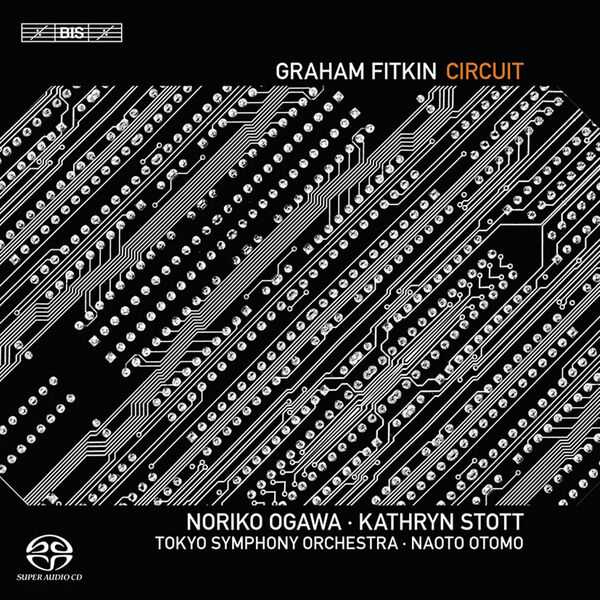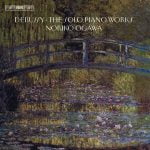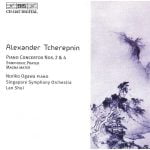

Composer: Graham Fitkin
Performer: Kathryn Stott, Noriko Ogawa
Orchestra: Tokyo Symphony Orchestra
Conductor: Naoto Otomo
Format: FLAC (tracks)
Label: BIS
Catalogue: BISSACD1517
Release: 2010
Size: 547 MB
Recovery: +3%
Scan: yes
01. Circuit
02. T1
03. Relent
04. Carnal
05. From Yellow To Yellow
06. White
07. Furniture
08. T2
One of the most prominent latter-day British minimalists, Graham Fitkin enjoys both renown in Europe and a kind of enfant terrible status in his native England, although this is gradually wearing off. Nevertheless, to know Fitkin is not necessarily to love him; blogger/composer Alex Christaki has written that Fitkin’s Mesh is “quite typical of a ‘contemporary’ style, meaning that its capturing texture feels to well adapted to today’s modern music. I also feel that once you have heard it a second hearing is unnecessary.” Another English critic once commented that “if I hear Fitkin’s Cud one more time I’m afraid I’m going to lose my mind.” While some voices in this controversy are firmly in Fitkin’s corner, those who are not suggest that his music hammers home the musically mundane, achieving a kind of hip obsequiousness. Indeed, those so convinced are unlikely to have their minds changed by Circuit, the four-hand piano concerto that is the leadoff work on BIS’ Graham Fitkin: Circuit, featuring esteemed solo pianists Noriko Ogawa and Kathryn Stott working as a team with, in the main work, the Tokyo Symphony under the direction of Naoto Otomo; the remainder of the disc is made up of solo and duo pieces from Fitkin’s standing catalog. Indeed, Stott and Ogawa plow their way through the 20 breathless minutes of the main work in a performance probably requiring more in the way of sheer stamina than virtuosity, but some of the other, smaller pieces included here are definitely worth investigating.
In her solo spotlights, Noriko Ogawa is her usual, irreproachable self; T1 is enjoyable in a Satiëan, distant way and Carnal is a loud, declamatory piece that Ogawa delivers with a sense of strength, projection, and great regularity. Despite the title, Relent, played by Stott, is pretty relentless in its forward progression and pursuit of ostinati; however, the four-hand White is pleasantly reminiscent of 1940s neo-classicism. Furniture and T2 both have some pretty interesting ideas, and indeed, there are interesting moments in all of these pieces. Among English minimalists, Fitkin represents a different school of thought from the established norm; unlike Nyman, Bryars, or Eno, he was not nurtured through contact with the British high priest of experimental music Cornelius Cardew, but — like his contemporary Steve Martland — with Dutch composer Louis Andriessen. While he might not always subscribe to Andriessen’s dictum that “one must make each successive measure different from the next,” he certainly has as much right — despite his critics — to record his music as anyone else, and Fitkin has gathered a fairly devoted constituency of listeners in the U.K. This BIS super audio CD with Ogawa and Stott is an A-plus quality recording of Fitkin’s music, a deluxe kind of platform that relatively few contemporary composers can expect to see in their lifetimes, and certainly will do — whether one is crazy about Fitkin or not so — to demonstrate his relative virtues and deficiencies in the most immediate and definitive fashion.
While his music is sometimes described as ‘post-minimalist’, Graham Fitkin himself mentions sources of inspiration as diverse as Stravinsky, Miles Davis, Webern, Steve Reich, Frank Sinatra and Pet Shop Boys. A talented pianist, he has written a number of works centred on the piano, in singular and in plural: his work list includes pieces for one to up to as many as six pianos. Partly it is the ‘black-and-white’ nature of the instrument that attracts Fitkin – the fact that it forces the composer to articulate musical structures without hiding behind colouristic resources. Important among his tools as a composer are repetition, and manipulation of repetitive procedures. The result is music that is often energetic and highly rhythmically driven – aspects which are certainly present in Circuit, for two pianos and orchestra. The work was composed for Kathryn Stott and Noriko Ogawa, and, at its first performance (in 2003), it was described by one reviewer as ‘exhilarating in the extreme’ with ‘its juxtapositions of motoric hyperactivity and sweet serenity, and a final, rip-roaring climax’. The serenity is otherwise mainly to be found in certain pieces for solo piano, such as the gentle miniature From Yellow to Yellow from 1985, the composer’s earliest acknowledged work. Kathryn Stott has worked with Graham Fitkin over a number of years, and the solo piece Relent, which she performs on the present recording, was written specifically for her. She and Noriko Ogawa, her regular duo-partner, have recorded a number of discs for BIS, both on their own and as a team. The two now present a selection of Fitkin’s numerous works for one and two pianos, as well as Circuit, in which they receive fine support from the Tokyo Symphony Orchestra conducted by Naoto Otomo.



